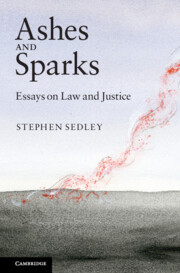Book contents
- Frontmatter
- Contents
- Preface
- Acknowledgements
- PART I History
- PART II Law
- PART III Justice
- 24 The right to know
- 25 The moral economy of judicial review
- 26 Policy and law
- 27 Responsibility and the law
- 28 The Crown in its own courts
- 29 Human rights – who needs them?
- 30 Fundamental values – but which?
- 31 Overcoming pragmatism
- 32 Sex, libels and video-surveillance
- 33 This beats me
- 34 Public inquiries: a cure or a disease?
- 35 Human rights: a twenty-first century agenda
- 36 Are human rights universal, and does it matter?
- 37 Bringing rights home: time to start a family?
- 38 The four wise monkeys visit the marketplace of ideas
- Index
28 - The Crown in its own courts
Published online by Cambridge University Press: 05 June 2012
- Frontmatter
- Contents
- Preface
- Acknowledgements
- PART I History
- PART II Law
- PART III Justice
- 24 The right to know
- 25 The moral economy of judicial review
- 26 Policy and law
- 27 Responsibility and the law
- 28 The Crown in its own courts
- 29 Human rights – who needs them?
- 30 Fundamental values – but which?
- 31 Overcoming pragmatism
- 32 Sex, libels and video-surveillance
- 33 This beats me
- 34 Public inquiries: a cure or a disease?
- 35 Human rights: a twenty-first century agenda
- 36 Are human rights universal, and does it matter?
- 37 Bringing rights home: time to start a family?
- 38 The four wise monkeys visit the marketplace of ideas
- Index
Summary
This essay, based upon the text of the 1995 Bernard Simons Memorial Lecture, draws on my work at the Bar on M v.Home Office [1994] 1 AC 377. We had had the support and advice of Professor Sir William Wade QC, and the lecture was recast as a contribution to Bill Wade's Festschrift, a volume with the magical title The Golden Metwand and the Crooked Cord – Coke's memorable dichotomy of law and discretion.
The last great, and almost unremarked, battle of the English Civil War was the constitutional contest between the executive, which saw the Crown's still wide prerogative powers as a reservoir of unreviewable discretion, and the judges, who regarded such arbitrary power as incompatible with the rule of law. I was present by chance, as a very new barrister, in the Lord Chief Justice's court on the day in 1967 when this hitherto silent battle erupted in a historic defeat for the executive on the justiciability of prerogative acts.
Then, in silk 25 years later, it fell to me to bring the principle full circle by satisfying the Court of Appeal that the executive, like the citizen, stands before the courts as a matter of obligation and not of grace, and that ministers who defy their orders can be arraigned for contempt. My opponent, John Laws, and I were both on the bench by the time the Crown's appeal reached the House of Lords. […]
- Type
- Chapter
- Information
- Ashes and SparksEssays On Law and Justice, pp. 269 - 284Publisher: Cambridge University PressPrint publication year: 2011



